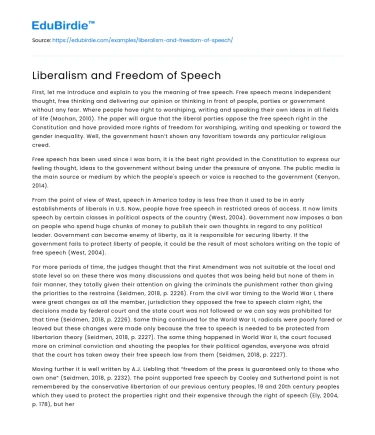Introduction
Liberalism, as a political and moral philosophy, champions individual liberties and rights, with freedom of speech being one of its cornerstone tenets. This principle, deeply rooted in the Enlightenment period, argues that an open discourse is crucial for democratic societies, fostering innovation, and ensuring governmental accountability. In recent decades, however, the boundaries of free speech within liberalism have been tested, as global societies grapple with the challenges of misinformation, hate speech, and digital communication. The debate centers on whether absolute free speech is feasible or if it requires limitations to protect societal values and individual dignity. This essay delves into the intricate relationship between liberalism and freedom of speech, exploring its historical significance, contemporary challenges, and the ongoing debate on its limitations.
Historical Significance of Free Speech in Liberalism
The conception of free speech within liberalism can be traced back to the Enlightenment era, which heralded a break from autocratic rule and the dawn of individual rights. Philosophers like John Stuart Mill, in his seminal work "On Liberty," posited that freedom of expression is fundamental to the pursuit of truth and personal development. Mill argued that the silencing of any opinion is a loss to society, as it deprives individuals of the opportunity to understand and refute it. This belief laid the groundwork for modern democracies, where free speech is seen not only as a personal liberty but as a mechanism for societal progress.
Save your time!
We can take care of your essay
- Proper editing and formatting
- Free revision, title page, and bibliography
- Flexible prices and money-back guarantee
Furthermore, historical instances underscore the role of free speech in catalyzing social change. The Civil Rights Movement in the United States, for instance, leveraged freedom of expression to challenge systemic racism and promote equality. Through speeches, protests, and media, activists like Martin Luther King Jr. articulated visions of justice and change that resonated widely, demonstrating the transformative power of speech. However, the historical context also reveals inherent tensions, as highlighted by cases where speech was curtailed, such as during wartime censorship or the McCarthy era's suppression of dissent. These instances reflect the ongoing struggle within liberalism to balance free speech with other societal needs.
Contemporary Challenges to Free Speech
In the contemporary landscape, the dynamics of free speech have been complicated by the rise of digital platforms and global interconnectedness. The digital age has democratized information dissemination, enabling diverse voices to be heard. However, it has also introduced challenges such as the spread of fake news and the amplification of hate speech. Social media platforms, while heralded as bastions of free expression, have faced scrutiny over their role in facilitating the spread of harmful content. This has led to calls for regulation and content moderation, raising questions about the extent to which speech should be free in a liberal society.
Real-life cases reflect these challenges, such as the controversy surrounding the de-platforming of political figures and the role of algorithms in shaping public discourse. Critics argue that such actions stifle free speech, contravening liberal principles. Conversely, proponents of regulation assert that unchecked speech can harm individuals and undermine social cohesion. As legal scholar Jeremy Waldron suggests, the harm principle – a key tenet of liberal philosophy – may justify restrictions on speech that incites violence or discrimination. This debate highlights the tension between preserving freedom and protecting societal well-being, a core dilemma in modern liberalism.
The Debate on Limitations and Counter-Arguments
While liberalism traditionally advocates for minimal restrictions on speech, the contemporary context necessitates a reevaluation of this stance. One argument in favor of limitations is the need to protect vulnerable groups from speech that perpetuates inequality or violence. As philosopher Catharine MacKinnon posits, freedom of expression should not come at the expense of others' rights and safety. This perspective is increasingly relevant as societies become more diverse and interconnected, requiring a reassessment of the balance between individual liberty and collective security.
Counter-arguments emphasize the slippery slope of censorship, where initial restrictions could lead to broader erosions of freedom. There is concern that regulating speech could empower authorities to silence dissent and marginalize unpopular opinions. Historical examples, such as the suppression of political opposition in authoritarian regimes, underscore the dangers of excessive limitations. Therefore, proponents of absolute free speech argue for self-regulation and public discourse as mechanisms to counter harmful speech, maintaining the liberal principle of open dialogue.
Ultimately, the debate underscores the complexity of navigating free speech in a liberal framework. It necessitates a nuanced approach that considers context, intent, and impact, rather than blanket restrictions. Legal frameworks, like the First Amendment in the United States, often serve as reference points, emphasizing the importance of safeguarding speech while acknowledging its potential harms. This ongoing discourse reflects the dynamic nature of liberalism, constantly evolving to meet new societal challenges.
Conclusion
In conclusion, the interplay between liberalism and freedom of speech encapsulates the enduring quest for balance between individual rights and societal needs. Historically, free speech has been a catalyst for progress and a safeguard against tyranny, embodying the liberal ideals of autonomy and innovation. However, contemporary challenges necessitate a critical examination of its boundaries, as digital communication and global diversity introduce new complexities. The debate on whether limitations are justified remains central to modern liberalism, requiring careful consideration of the principles of harm and justice. As societies continue to evolve, the discourse on free speech will remain pivotal, shaping the future of democratic engagement and liberal values.






 Stuck on your essay?
Stuck on your essay?

